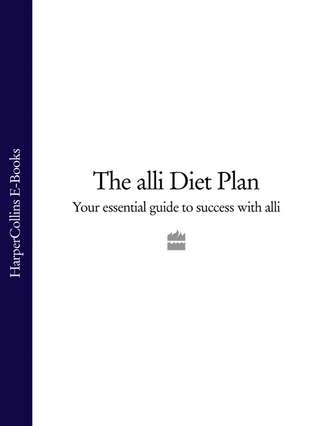
Полная версия
The alli Diet Plan: Your Essential Guide to Success with alli


the alli diet
Your essential guide to success with alli

Copyright
HarperCollinsPublishers Ltd. 1 London Bridge Street London SE1 9GF
www.harpercollins.co.uk
First published by HarperCollinsPublishers 2009
Copyright © The Philip Lief Group Inc. 2009
alli is a registered trademark of the GlaxoSmithKline group of companies.
A catalogue record of this book is available from the British Library
Although every effort has been made to ensure that the information in this book is accurate, it must not be treated as a substitute for qualified medical advice. Always consult a medical practitioner before starting any diet or exercise programme. Neither the author nor the copyright holder nor the publisher can be held responsible for any loss or claim arising out of the use or misuse of the suggestions made or the failure to take medical advice.
alli 60 mg capsules are a pharmacy-only weight-loss aid containing orlistat. For overweight adults with a BMI of 28 or over. Always read the label.
All rights reserved under International and Pan-American Copyright Conventions. By payment of the required fees, you have been granted the nonexclusive, nontransferable right to access and read the text of this e-book on-screen. No part of this text may be reproduced, transmitted, downloaded, decompiled, reverse engineered, or stored in or introduced into any information storage and retrieval system, in any form or by any means, whether electronic or mechanical, now known or hereinafter invented, without the express written permission of HarperCollins e-books
While every effort has been made to trace the owners of copyright material reproduced herein and secure permissions, the publishers would like to apologise for any omissions and will be pleased to incorporate missing acknowledgements in any future edition of this book
Source ISBN: 9780007293728
Ebook Edition © August 2016 ISBN 9780007381074 Version 2016-08-24
Contents
Cover
Title Page
Copyright
Chapter 1 What is alli?
Chapter 2 Your Diet Essentials
Chapter 3 The Menu Plans
Chapter 4 Recipes
Breakfasts and Brunches
Soups
Sandwiches and Light Lunches
Main Course Salads
Poultry
Meat
Fish and Seafood
Vegetarian
Sides
Pasta
Sauces, Dressings and Dips
Desserts
Bites
Recipes by kcal per portion
Recipes by fat per portion
Chapter 5 Eating Out
Chapter 6 Going Shopping
Chapter 7 Exercise
Chapter 8 Keep Going!
Chapter 9 Portion Guide and Calorie-counter
Acknowledgements
About the Author
About the Publisher
Chapter 1 What is alli?
Successful Weight-loss Starts Here
Losing weight will not only help you to feel better in yourself, it will also reduce your health risks. Sounds obvious, doesn’t it?
However, it’s no secret that losing weight can be really hard work. In spite of knowledge and determination, it can be a real struggle to lose weight and keep it off.
That’s why alli is an exciting development for adults who are overweight, with a BMI of 28 or above, and who want to make positive changes to their weight. It isn’t a miracle pill or a crash diet; it’s the first pharmacy-only weight-loss aid to be licensed for use throughout Europe. Also available is the alli support programme to guide you towards your weight-loss goal.
Adding alli to a reduced calorie, lower-fat diet is clinically proven to help you lose 50% more weight. So for every 2 lb (1 kg) you lose from dieting, alli can help you lose an extra 1 lb (0.5 kg).
The alli programme is a sensible approach to losing weight which helps you commit to lasting, positive changes to your eating and lifestyle habits.
How Is alli Different?
alli is a clinically proven weight-loss aid that should be combined with a reduced-calorie, lower-fat diet. You should also try to introduce more activity into your daily life. The alli programme can help you break your old habits and follow a healthier lifestyle.
alli works by attaching itself to some of the enzymes that break down fat. This stops about a quarter of the fat you eat from being digested and absorbed, so the unabsorbed fat passes naturally out of the body.
When you take alli, you have the reassurance that it is the first pharmacy-only weight-loss aid licensed throughout Europe.
With alli, you also have the reassurance of knowing that it’s been extensively studied in clinical trials.
Visit www.alli.co.uk for more information. Remember to read the label and the information leaflet in the alli pack before you start.
What Is alli?
alli is a capsule taken with a reduced-calorie, lower-fat diet.
alli is not a quick fix or a miracle pill. As we all know, quick fixes never work.
The alli programme requires you to make simple but significant changes to your eating habits. It also recommends that you combine these changes with a more active lifestyle.
It shows you how to make positive, long-term changes in your life and provides you with essential tools and techniques so you can keep the weight off.
How Does alli Work?
• In order to digest the food you eat, your body releases natural enzymes.
• There are different enzymes to break down proteins, carbohydrates and fats.
• alli contains orlistat which only works on the enzymes that break down fat, so proteins and carbohydrates aren’t affected and you can absorb all of these nutrients.
• As alli can lower the levels of some vitamins absorbed by your body, you should take a multivitamin containing vitamins A, D, E and K every day at bedtime (when you will not be taking alli) to help ensure the vitamins are absorbed.
• alli stops the enzymes digesting about a quarter of the fat you eat. As the undigested fat can’t be absorbed, it passes naturally out of the body.
• Fat is the most calorie-dense food, so preventing the absorption of some of it with alli and eating reduced-calorie, lower-fat meals helps you lose weight.
Diet-related Treatment Effects
Since alli works on the enzymes in your body to prevent some of the fat you eat from being absorbed, if you eat too much fat at any one time, you may notice some bowel changes. These are known as diet-related treatment effects and can include any of the following:
• fatty or oily stools
• loose, soft stools
• sudden bowel motions
• wind (flatulence) with or without oily spotting.
Controlling the fat content of your meals will help you avoid these effects.
It’s really a very simple equation: as alli prevents the absorption of about a quarter of the fat you eat, if you eat a chicken meal containing 15g of fat, 4g of undigested fat passes out of your body. In the same way, if you eat a hamburger meal containing 80g of fat, you will pass 20g of undigested fat.
Therefore, any diet-related treatment effects can be minimized by keeping within the recommended amounts of fat per meal and snack.
Your Signal
The surplus fat that passes naturally out of your body is simply undigested fat. If you experience any of the diet-related treatment effects, this is a signal that you have eaten a meal or snack that may have contained more fat than the recommended fat target. Please refer to the tables further on in this book for more information on recommended fat targets.
Tips for Avoiding Diet-related Treatment Effects
Managing diet-related treatment effects is an important part of making alli work for you. Here are some tips to help you stay in control.
• Start your lower-fat diet a few days, or even a week, before you begin taking the capsules.
• Find out more about how much fat your favourite foods typically contain and the size of your portions (check the labels). By getting used to more appropriate portion sizes, you’ll be less likely to accidentally go over your fat target.
• Distribute your fat allowance evenly across your meals for the day. Don’t ‘save’ fat grams from lunch and ‘spend’ them at dinner – each meal and snack must be within your fat target.
• Be patient. It may take a little time to familiarize yourself with your fat and calorie targets. Most users who experience diet-related treatment effects at the start learn how to reduce them.
• Keeping a food diary is an invaluable tool for helping you to recognize which foods can lead to diet-related treatment effects. Jot down helpful notes and favourite recipes – you’ll soon get into the swing of things.
Is alli Right for Me?
alli is for people who are ready and willing to make the necessary adjustments to their lifestyle. If you are an overweight adult aged 18 or over with a Body Mass Index (BMI) of 28 or over, alli can help you to lose weight. Visit www.alli.co.uk to work out your BMI.
alli is an effective weight loss aid, but it’s not suitable for everyone. Talk to your pharmacist to determine whether alli is right for you. Make sure you also read the information contained in the alli pack before you start taking alli.
alli is already helping thousands of people lose weight and make positive changes to their lifestyle. You too could enjoy success with alli if you’re willing to make some simple, long-lasting changes to your eating habits. Your commitment is the key to your success.
Losing weight doesn’t happen overnight, so alli and the alli programme encourages gradual, steady weight loss of 1–2 lb (0.5–1 kg) a week. The alli programme can inspire and teach you to adopt healthier eating habits. Step by step you can do it with alli.
Losing even a modest amount of weight can significantly reduce the risk of developing several serious health problems, such as diabetes and heart disease. If you are concerned about the risks associated with being overweight, see your doctor for a check-up.
How to Take alli
Take one capsule, three times a day at mealtimes – this usually means one at breakfast, lunch and dinner. (Remember to make these meals well balanced, reduced calorie and lower-fat.)
Take alli just before, during or up to one hour after meals. Swallow the capsule whole with water.
If you miss a meal, or your meal doesn’t contain fat, don’t take a capsule – alli doesn’t work unless there’s some fat in the meal.
Do not take more than 3 capsules a day.
Remember also to take a multivitamin tablet at bedtime (containing vitamins A, D, E and K). As alli removes some of the fat you eat from your body, some fat-soluble vitamins are removed with it. Taking a daily multivitamin ensures that you have an adequate supply of these vital nutrients.
Adjusting to Your New Lifestyle
There are a few simple but fundamental changes you will need to make in your life to succeed with the alli programme.
Here’s what you need to be willing to do to join the thousands who are succeeding with alli:
• adopt a reduced-calorie, lower-fat diet
• plan your meals
• manage your cravings and setbacks
• take guidance from the alli programme.
Achieving your goal with alli isn’t complicated; it just takes a little practice to get into the new habits. As well as sticking to a reduced-calorie, lower-fat diet, becoming more physically active is part and parcel of becoming healthier. Like most things in life, once you’re used to them, they simply become part of your daily routine.
Commit to a Reduced-calorie, Lower-fat Diet
Why Reduce Calories?
Calories are a measurement of the energy your body needs to function. When you eat more calories than your body needs, it stores the excess energy as fat.
Your calorie target is the maximum number of calories you should eat per day. This target varies, according to your weight, gender and activity levels. You can use the chart (below) to set your daily calorie targets.
Before you can set your calorie targets you’ll need to know your activity level. The more active you are, the higher your calorie limit. Choose which activity level most closely fits your daily routine. If you’re unsure which is your level, choose ‘low’.
• Low activity = you do little or no walking, stair-climbing, gardening or other physical activity on a daily basis
• Moderate activity = you burn around 150 calories a day in physical activity, for example, walking 2 miles (3 kilometres), gardening for 30–45 minutes, or running 1.25 miles (2 kilometres) in 15 minutes.
Calories for Women

Calories for Men

Lower Fat Is Key
You may be surprised to know that alli doesn’t require you to eliminate fat completely from your diet. Eating the right amount of fat helps the body absorb vitamins and perform other essential functions.
Your fat target is the maximum amount of fat each meal and snack should contain for you as an individual while on the alli programme. This is based on your daily calorie intake. When you follow the alli programme, you’ll be focusing on the total amount of fat, not whether it’s unsaturated or saturated.
Use the chart below to set your fat target for each meal and snack.

Reducing fat not only helps you to lose weight, it is also the way that you will be able to manage any diet-related treatment effects such as fatty or oily stools, sudden bowel motions and wind (flatulence). These effects are caused by the way the alli capsules work on the food you eat: because alli prevents the absorption of some of the fat in the food you eat, this unabsorbed fat passes naturally out of the body. Be reassured that most new alli users who experience these effects learn how to manage them by staying within their recommended fat targets.
Tastier, Healthier Food
alli is dedicated to helping you eat a tasty, nutritious and varied diet. Although it’s important to limit the foods that are high in fat and calories, there are lots of other delicious choices open to you.
Lower-fat doesn’t have to mean lower-taste; we have lots of easy, satisfying recipes and meal ideas to prove it. The advice in this book should enable you to eat satisfying, balanced meals without feeling bored or deprived.
Enjoy trying new things and varying your meals with alli.
Eating Together
With the alli programme you will be able to eat such a variety of delicious food that your whole family can enjoy the same meals as you. Some of the recipes are written for two, some for more, and many are adaptations of family favourites.
At the Table
Putting the right amount of the right foods on your plate is a simple but important part of achieving success.
Try downsizing your plate to downsize your portions. If you use a plate that’s 20cm (8 inches) across, it’ll look fuller so you won’t feel you’re missing out.
When you’re sure of your portion sizes at home, you’ll then find it easier to judge how much you should eat when you dine out (restaurants usually serve bigger portions than you need).
Planning Your Meals
Ideally, you will plan your meals while you’re on the alli programme so you can stay within your recommended fat target per meal. Knowing what you’re going to eat a few days in advance puts you in control and raises your chances of success. Planning ahead helps you avoid making last-minute choices which are too high in fat and calories. It also enables you to experiment with new recipes.
In reality, you probably won’t be able to plan every meal. However, as you learn more about the programme you should be able to assess what will and won’t work within the programme for you. This book will help.
Shopping
Try not to go shopping when you’re hungry. You could be tempted by fatty convenience foods and may start snacking on your way home.
Also, if you don’t already make shopping lists, start now and try to stick to them.
There are lots more tips on better (and smarter) shopping later in the book.
Move Your Body and Shift the Weight
The alli programme recommends you increase your physical activity levels to help you lose more weight.
When you consume fewer calories your body has to use its fat stores for energy and, as it does that, you lose pounds. When you exercise, you encourage your body to burn fat stores more often and, as a result, help increase your weight loss. Upping your activity levels should help you lose more weight.
Incorporating more physical activity into your everyday life is easier than you think. There are lots of fun and easy ways to exercise.
Exercising isn’t just good for your body, it’s a well-known fact that it’s good for your mood and relieves stress, too. It’s not just about joining a gym; there are lots of other ways to get moving and burn calories.
Whatever shape you’re in and however busy you are, it’s still possible to be active every day. Start gently and increase slowly. Begin with 10 minutes’ extra walking a day. If you’re already active, then build up the time or add in something else as well.
Remember to check with your doctor before you start any new exercise programme.
There’s a chapter on exercising as part of the alli programme later in the book, but here are some tips to get you thinking about how to include more activity in your daily life:
• Write your goals down somewhere you will see them every day.
• Break your goal into long-term and short-terms goals that are achievable.
• Involve family and friends in your weight-loss plan.
• Take the stairs more often at home – make extra trips and burn extra calories.
• Don’t sit down when you make a phone call – walk about the house while you talk.
• Cleaning is good: hoovering, mopping and dusting are all excellent activities for burning fat.
• Take a seat on an exercise ball. It will help you sit up straight and work your abdominal muscles.
• Get off the bus one stop early. When you feel ready you can try two stops earlier!
• Cycle rather than driving whenever you can.
• Walk up escalators.
• If you take the lift, get out a floor early or take the stairs from ground level.
• Park further from the shops and walk the rest of the way there. Supermarket car parks can be huge, so get into the habit of parking as far away from the shop entrance as possible.
• Walk the dog! A brisk daily walk will help burn off any extra calories consumed.
• Get gardening – a great way to burn some extra calories.
Managing Cravings …
Cravings can be the downfall of many dieters.
It’s important to learn, therefore, to recognize whether your body is hungry or if you’re experiencing a craving for something. Hunger is an empty feeling in your stomach – a signal that you haven’t eaten anything for several hours. A craving doesn’t mean that your body is hungry; it usually happens when you feel like eating a certain type of food. It can be triggered by stimuli outside the body, such as stress, changes in emotions and seeing or smelling something appetizing.
It would be unrealistic to tell you that you won’t experience cravings, but it is possible to control them and limit the damage they can cause.
Tips for Beating Cravings
• Drink a glass or two of water – sometimes your body is thirsty and not hungry at all.
• If you feel like chocolate, whisk up a cup of reduced-calorie hot chocolate with water or skimmed milk and a shake of cinnamon on top.
• If you’re at home, do something to take your mind off the craving – walking away from the fridge and out of the kitchen is a good start! You could try phoning a friend, doing 10 star jumps or taking up knitting to distract yourself.
… and Setbacks
Blips. Bumps in the road. Snack-attacks. Whatever you call them, they happen to everyone. The essential factor is how you handle the setback.
If you eat the wrong foods and/or too much of them, don’t be too hard on yourself because that can make things worse. Instead, accept that it’s happened and decide why, so you can aim to avoid the same mistake again.
• After a setback, make your next meal really tasty and within the accepted fat and calorie limits.











